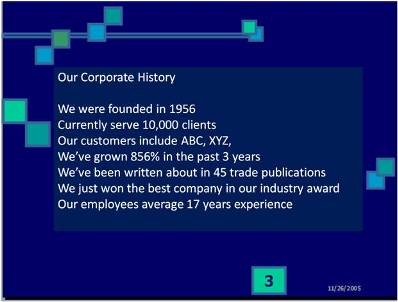Imagine you’re out on a date (it could be date night with your spouse, or a blind date with a total stranger, or whatever). Now, let’s say you really want to win that date over, become the only person in the room he or she can see or hear. We’re talking full-blown smitten here. How do you think you should start that date: by talking about yourself, or by talking about your date?
Now, mostly everybody gets the right answer in the date scenario: of course, you talk about them. But here’s the shocker: In the world of business presentations, a place where you also want to quickly capture the positive attention of your audience, almost everybody gets it wrong. And it’s destroying a lot of potentially great presentations.
Let me prove it to you…
Over 90% of the presentations we’ve studied began with a slide that looks like this:

Unless you’re attending a narcissist’s convention, this slide is terrible. You don’t even have to read every bullet point to feel the automatic turn off. This slide is all about “you”: when you were founded, how many clients you have, how big you are, how many awards you’ve won, etc. In the blind-date equivalent of this slide, you’d be sitting alone at the bar before the first round of drinks arrived. It doesn’t matter if you are presenting to one person or a thousand, the only way to grab your audience’s attention is to spend the first 10 minutes talking about the issues that matter to your audience and whether or not you can meet their needs.
Neurologically, the first 10 minutes are the most important. It’s during these first precious moments that your audience forms their opinions about you, when their brains decide whether or not to allocate any more neurological energy to listening to you.
Let’s jump back to the dating scene for a minute. Perhaps you’ve heard of a free online dating site called OkCupid. Now, I married my high school sweetheart, so I’m not there trolling for dates, but I am impressed with their statistical research. OkCupid has a very advanced statistics shop called OkTrends, where they study the hundreds of millions of OkCupid user interactions. In one study, they looked at the kinds of words men use in their opening messages to women in order to learn what does (and doesn’t) generate a reply. If you’re not familiar with how online dating works, basically, you check out people’s profiles on the website, and if you like what you read, you send that person a message and hope you get a response. (And then, maybe after that, you meet for an actual date, like we used to do in the old days).
You can just imagine the cheesy messages that the study revealed don’t work (i.e. women did not reply to the man’s message). But you know what phrases generated HUGELY POSITIVE responses? “You mention,” “noticed that,” and “curious what” all got fantastic responses. (Statistically, messages with those phrases get double the normal response rates).
Basically, if a guy appears to have read a woman’s profile, and shows knowledge and interest in the things she’s interested in, he’s got a much greater chance of hearing back from her. A good message would sound like this: "You mention that you like cooking and I noticed that you travelled to Italy. I’m curious what your favorite region was in terms of cuisine?" That’s the kind of guy we fathers might let our daughters date. (I also have a son, and when he hits dating age, he will be forced to read all of this research).
The lesson in all this is: Whether you’re dating or making million-dollar presentations, always start the interaction by talking about the other person and their interests. Let them know that you know what they want to hear about, that you are sensitive to what they want to gain from this interaction, that you care about the same things that they care about. And if you don’t know what your audience’s interests are, it’s your job as presenter to find out: sooner rather than later.
People want to hear about things that meet their needs and solve their problems. They don’t care how long you’ve been in business (unless that just happens to be the one big question they really need to get answered—but I wouldn’t bet on it). Your audience cares about whatever they care about, and that's what you need to give them. Meet their needs, and you'll hear nothing but applause.
